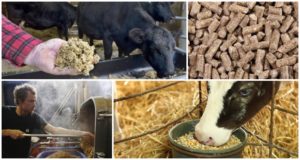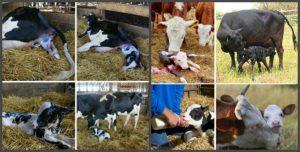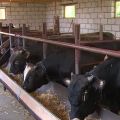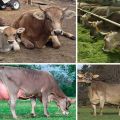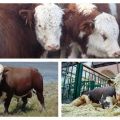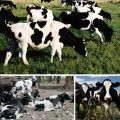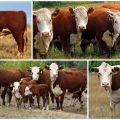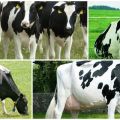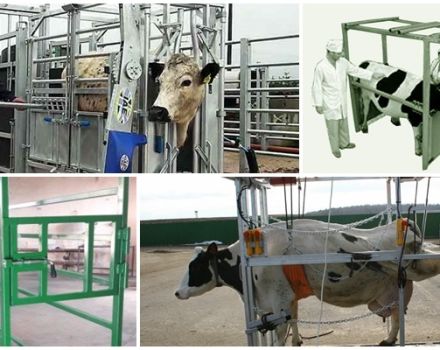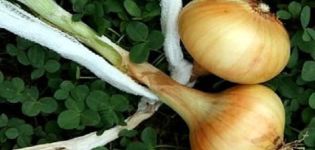Types of drinking bowls for cows and how to do it yourself, step by step instructions
Different types of drinking bowls for cows and calves are important components of a livestock complex. Without free access to clean drinking water, individuals will not be able to fully develop, respectively, productivity decreases. Special equipment can be purchased or manufactured independently, adhering to certain standards and sanitary requirements.
What are drinkers for?

Automatic drinker for cows
Drinking bowls for cows and calves are an integral part of the farm. They are of a special design. Their main task is to provide livestock with clean water. For cattle, it is considered important to consume water in the amount that is required for them from a physiological point of view.
Cows are large animals, so the water consumption on the farm is high. An adult consumes up to 70 liters per day, a calf up to 6 months - 25 liters. If there is not enough water, then some pathologies develop, which means that the productivity of animals will suffer.
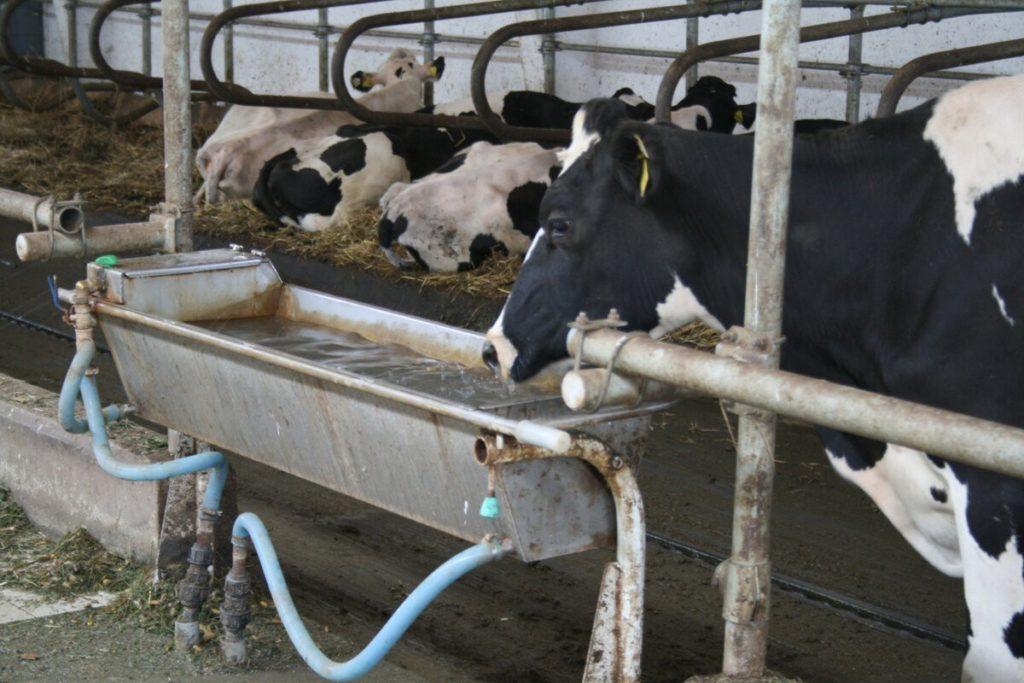
Drinking containers on the farm
A high-quality drinking bowl for cattle not only provides animals with water in the required amount, but also facilitates the work of the farmer. Drinking equipment regulates the water supply, simplifies the cleaning procedure, and guarantees the sanitary safety of individuals.
Kinds
There are many varieties of drinking equipment. They differ in the material from which they are made, in the type of use and purpose. There are tanks for calves and calves, as well as installations that are used in winter or are suitable for use on pastures.
Group

Group drinking equipment
Group types are used on farms with loose-fitting method of keeping cattle. There are stationary and mobile, which must be used for free grazing of livestock. The circulation of water in the device ensures a comfortable temperature for the animals.
They are large in volume, easy to maintain, convenient, and can be used by several animals at the same time. They are of the tiered type. However, they have a drawback - with such a watering system, there is a high risk of infection of the livestock through a sick individual.
Individual

Individual device
Individual containers are more suitable for cattle tied keeping. For economic reasons, farmers often make them with their own hands. When properly designed and installed, individual drinking devices are stable and hygienic. Among the minuses - water spoilage due to stagnation, the need for frequent washing.
For pasture
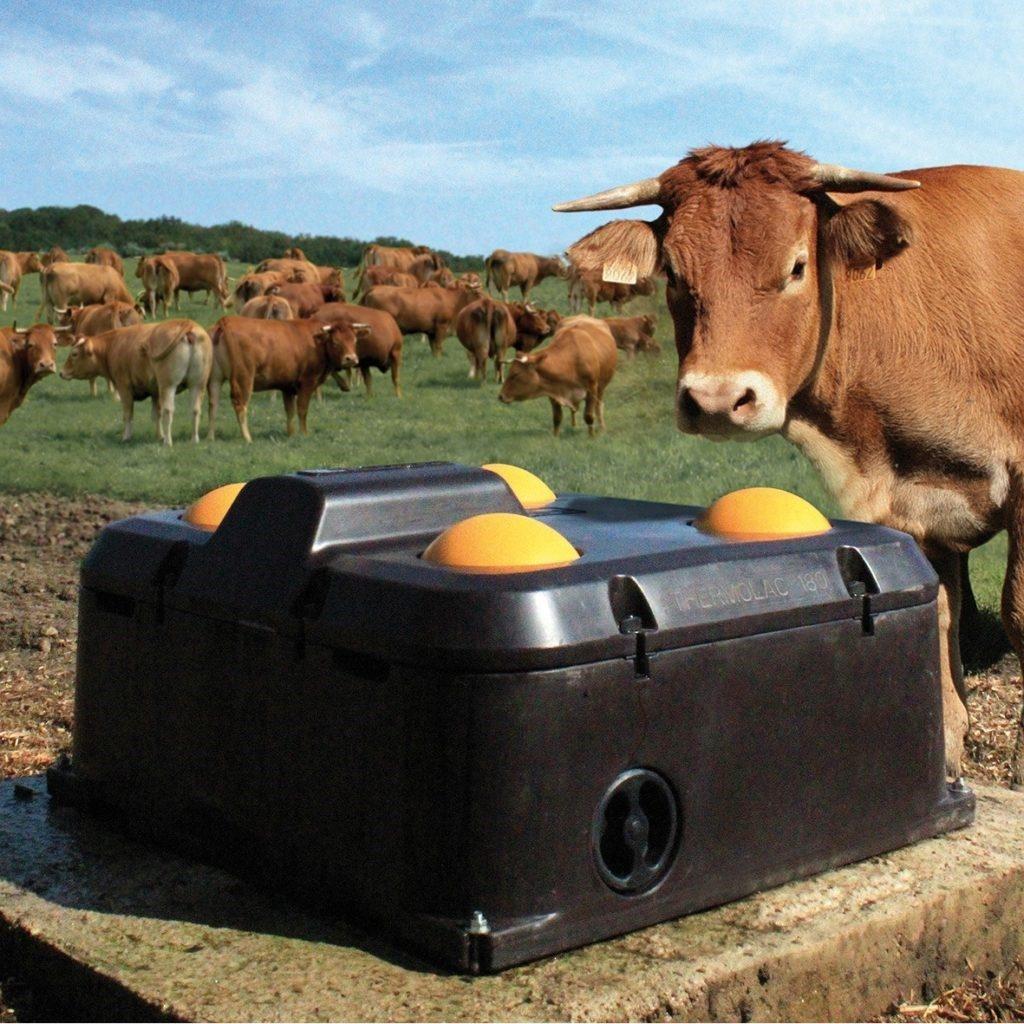
Isothermal device for drinking cows in a pasture
While grazing, animals need to drink frequently. The farmer must ensure that the cows have free access to clean drinking water, so a mobile drinker is needed on the pasture. As a rule, animals go to the watering place in large groups.
For drinkers that are located on pasture, the main requirement is put forward - a large volume of capacity.
The volume of the tank should be selected based on the number of livestock. They come in from 30 to 1500 liters. Water is constantly pumped up and the container is filled. If it is supplied from open reservoirs or wells, filters must be used.
For the stall

Stall equipment
The stall drinker is designed for large herds. The device consists of the following elements:
- nipple valve (i.e. nipple);
- sealing block;
- body made of anti-corrosion metal.
In the upper part of the body there is an element that supplies running water from the water supply system. Experts note that nipple drinkers are hygienic, easier to maintain, and the likelihood of breakage is several times less than that of other types of structures.
Automatic

Drinker scheme
Automatic drinkers for cattle are equipped with a valve-float feeding system. Their advantage is that water re-enters them as the animals consume. As soon as the liquid level begins to decrease, the filling of fresh water begins in automatic mode. This type is designed in such a way that the incoming water is evenly distributed over the tanks, and the cows drink to their fill.
The signal for water supply is a float, which, reaching the bottom, signals the need for replenishment. Some automatic systems are made only on the basis of a valve, and the heads of animals play the role of a float. Pulling to the bottom, they press on the valve, and water enters the container. However, such devices are considered not entirely practical, since animals often incapacitate them.
For calves

Teat calf drinker
If there are few calves or bulls on the farm, then you can get by with a suitable container. However, in large farms, it is more advisable to install a stationary drinker. It is designed for 8-10 individuals. Such devices are equipped with a heating system, do not require filling control, are stable and spacious.
Winter
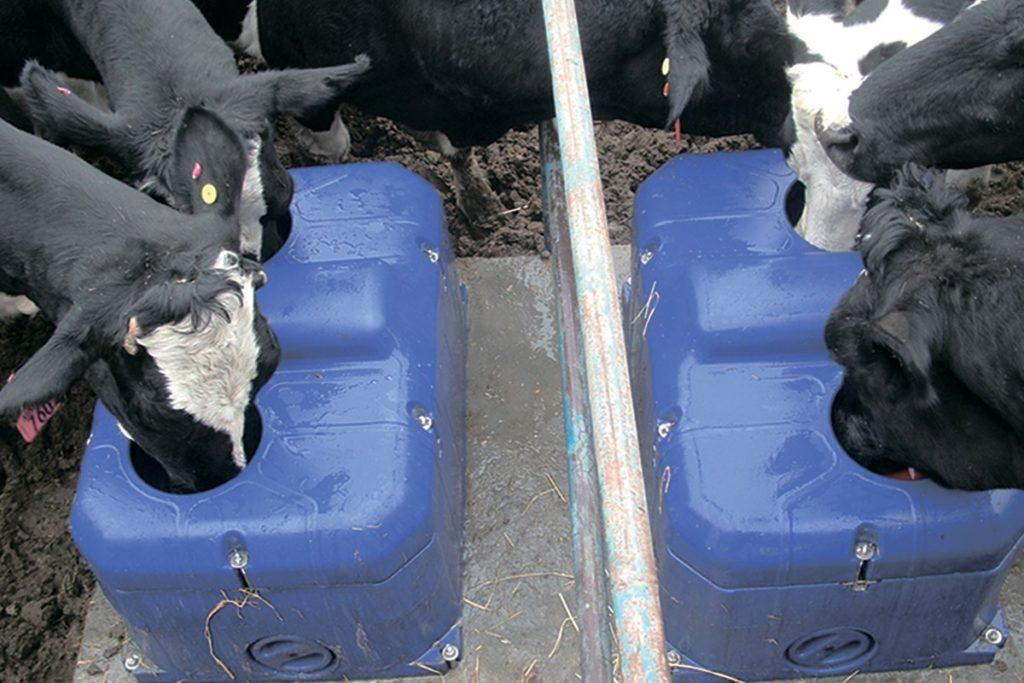
Heated level tanks
Daily exercise is a guarantee of health and high productivity, as well as the prevention of a number of diseases. Animals should be in the fresh air for a certain time in motion. The winter season is no exception. It is clear that even in these harsh conditions, cows need clean water.
The equipment must be grounded, insulate communications. It is recommended to use heating equipment in conjunction with automated drinkers.
Primary requirements

Device inside
A number of requirements are imposed on drinkers for cattle:
- low level of trauma, both for animals and for service personnel;
- environmental friendliness;
- strength and stability;
- ease of use and maintenance;
- fit for size and age.
Before purchasing, you should take into account the volume of the container, think over the installation location, and also choose the installation method.
Drawings and materials
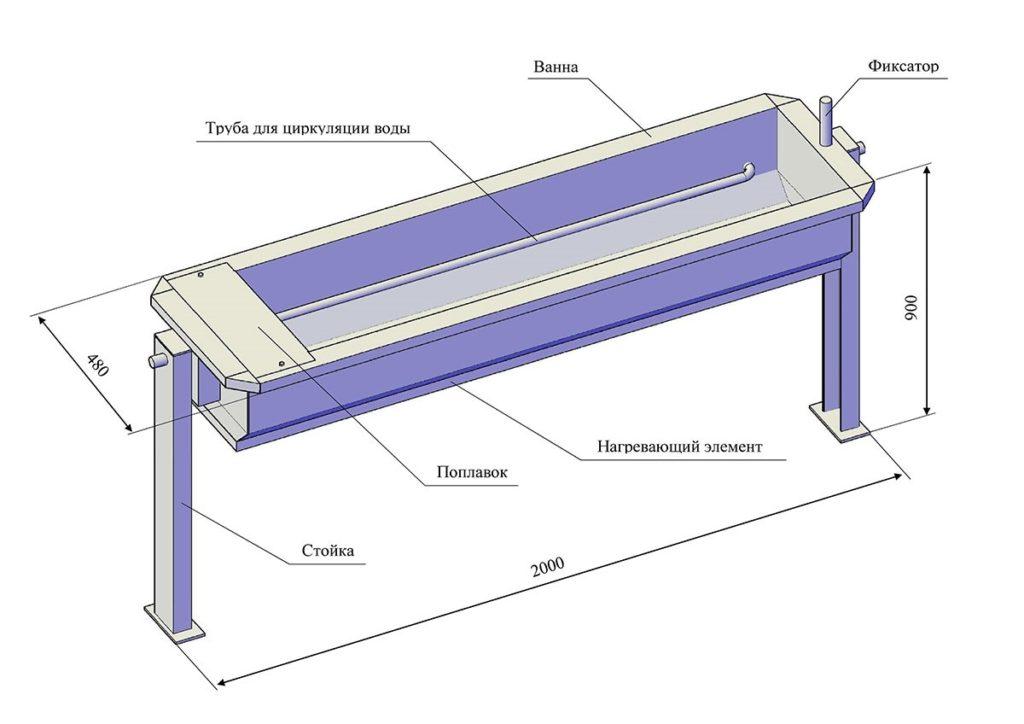
Heated tank
The main requirement for the material is safety and high strength. Regardless of the material, the structure for drinking should be comfortable and functional. Elements of the device: a bucket for drinking, a distribution unit, a supply pipeline.Drinking systems vary in design, as well as materials, but they must be comfortable and use fluid economically.

Heated group drinker
For adult animals, a container with dimensions of at least 2.20 * 0.7 * 1 m is required. The volume of the tank is 150 liters. The length depends on the age of the cows served. The optimal value is 1.5-2 m. The upper side of the tank should be raised from the floor by 0.8-1 m so that the animal does not bend its neck during drinking.
DIY making
To make a drinker for cows, you yourself need to familiarize yourself with the rules of use, basic requirements and the nuances of the device. A do-it-yourself design is often a container with a float valve mechanism. The troughs that are required in drinking systems are made of brick, wood or concrete. For these purposes, a galvanized steel sheet is also suitable.
Of the tools for work you will need:
- welding machine;
- drill;
- screwdriver;
- a hammer;
- file;
- roulette.
The choice of material depends on the size of the barn and the number of individuals in the herd.
Made of metal

Metal level container
It is better if the drinker is made of galvanized steel or stainless steel. Such products are durable, meet the requirements and standards, and have a long service life. In addition, they are resistant to cleaning and disinfection.
Made of wood
Wood is considered an environmentally friendly material. It is durable and will last a long time. However, careful processing of wood will be required before making the drinker. Only if it goes through cleaning, painting with special non-toxic paints, processing the cracks with resin, will it last for a certain period.
Despite the serious preparation of the material, over time, the wood will become damp from exposure to moisture, and the process of decay will begin.
Made of plastic
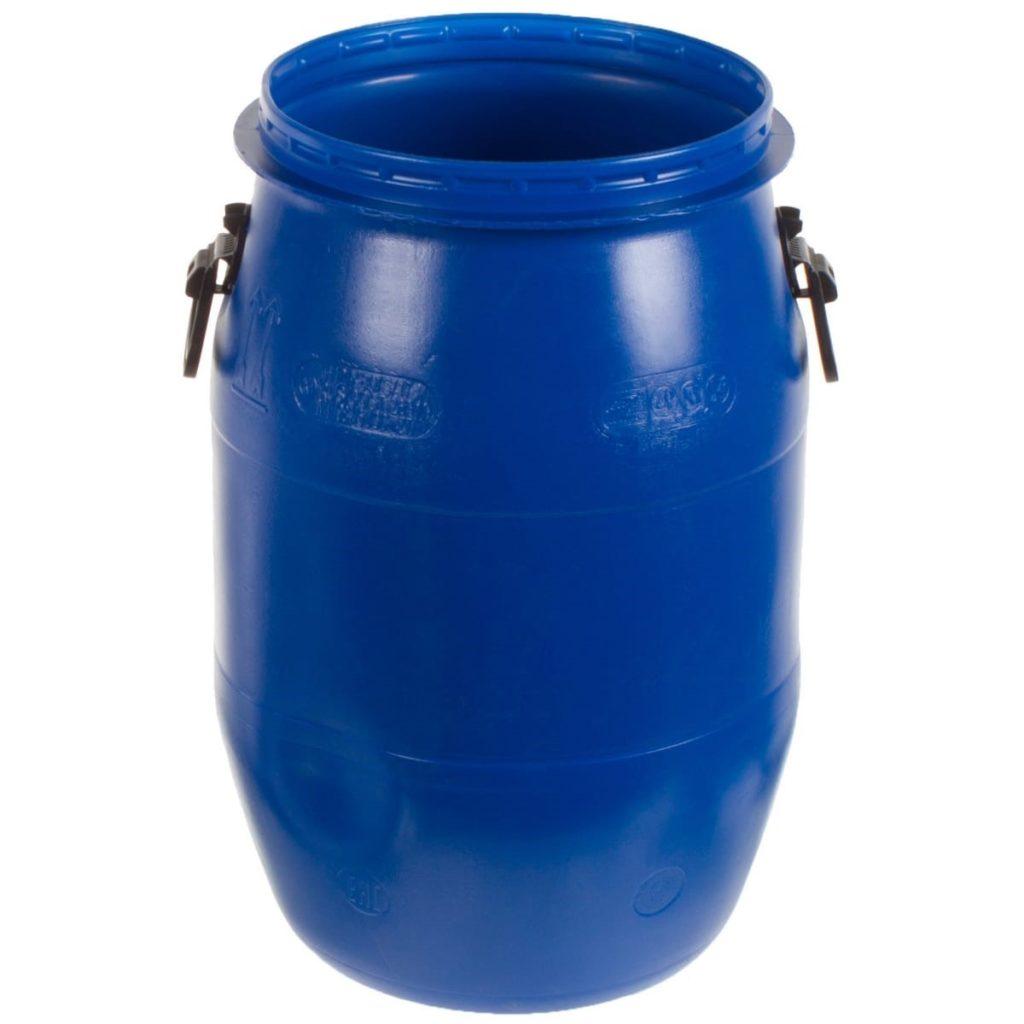
Drinking bowls for cows are made from a barrel
Plastic is a popular material for drinking bowls. High-quality plastic is durable, disinfectable and cleanable with abrasive substances. Often a plastic barrel is used for manufacturing, cut lengthwise into two halves.
Brick
Brick drinkers are the most durable, but they also have drawbacks. The material will require careful processing (plastering) both from the outside and from the inside. Moreover, the components should be neutral and clean from an environmental point of view.
